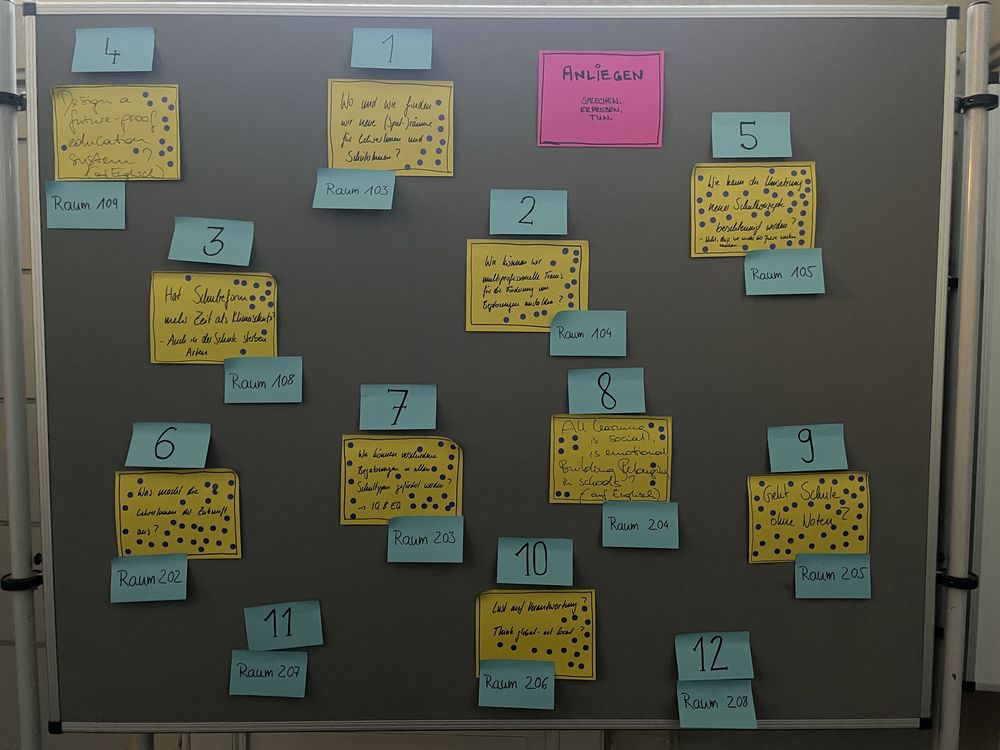Ihr Raum für Ihre Anliegen
Für Ihre Anliegen zum "Zukunft gestalten. Heute" haben wir über das Programm verteilt kleine Inseln zum freien, gemeinsamen Sprechen, Erproben und Tun angelegt. So können Sie sich zu Ihren Anliegen und Ideen gemeinsam niederlassen und verabreden. Wo ließen sich z.B. Räume für zukünftigen Austausch finden - oder konkrete Projektideen, auch über Schule hinaus, entwickeln? Probieren Sie es aus! Papier und Stift legen wir für Sie bereit. Die Aus- und Einwahl in die Themen(räume) Ihrer Anliegen findet vor Ort statt.
Wie Sie weiter unten sehen, haben zwei Gäste Ihre Anliegen schon formuliert. Entdecken Sie selbst.
... Ihre Anliegen im SPIELRAUM [22].

Anliegen 1
Raum 103
Wo und wie finden wir neuen SPIELRÄUME für Lehrer:innen und Schüler:innen?
Anliegen 2
Raum 104
Wie können wir multiprofessionelle Teams für die Förderung von Begabungen ausbilden?
Anliegen 3
Raum 108
Hat Schulreform mehr Zeit als Klimaschutz? Auch in der Schule sterben Arten.
Anliegen 4
Raum 109
Design a future-proof education system? (auf Englisch)
Anliegen 5
Raum 105
Wie kann die Umsetzung neuer Schulkonzepte beschleunigt werden? - Nicht, dass wir wieder 60 Jahre warten müssen...
Anliegen 6
Raum 202 und Raum 208
Was macht die Lehrer:innen der Zukunft aus?
Anliegen 7
Raum 203
Wie können verschiedene Begabungen in allen Schultypen gefördert werden? IQ & EQ?
Anliegen 8
Raum 204
All learning is social, all learning is emotional. Building Belonging in schools? (auf Englisch)
Anliegen 9
Raum 206
Geht Schule ohne Noten?
Anliegen 10
Raum 205
Lust auf Verantwortung? Think global - act local?
design a future-proof education system?
– ein Angebot von Anant Jani
The 21st century has presented society with unprecedented and unpredictable systemic shocks including the 2008 global financial collapse, the COVID-19 pandemic and, of course, climate change. Today's children will be tomorrow's leaders. They will have to face new problems head on and will need to find and/or create solutions to ensure that the challenges they face do not completely destabilise their world. The most important tool and gift we can give our children is a strong education that will empower them to identify, understand and tackle the problems they face while also creating a better world for them and for the future. But a question we must ask ourselves is if the education systems we currently have are actually sufficient to equip our children to face such an uncertain future?
In this session, we would like for you to imagine that you are a Minister of Education in one of the federal states in Germany and have a blank slate and complete power to design a future-proof education system that equips our children to face the future. What would your future education system look like? What would it do to empower our children? What skills would it equip them with? What outcomes would it deliver for them?
about Anant Jani

Anant has worked with healthcare systems in the UK and Europe at national, regional and local levels to help them improve patient and population outcomes while optimizing resource utilization. He also has experience working with NHS England and Public Health England in promoting patient-centred design of care pathways. Currently, Anant is a research fellow at The Oxford Empathy Programme at the Faculty of Philosophy at Oxford University.
Building Belonging
– ein Angebot von Carolyn Streets
All learning is social. All learning is emotional. What does this statement mean to you? Decades of research studies evidence that when students participate in school-based SEL programs, they are more likely to do better in school and beyond. SEL creates, fosters, and depends an equitable learning environment, where all students and adults feel respected, valued, and affirmed in their individual interests, talents, social identities, cultural values and backgrounds. While SEL is not a panacea for every challenge within the education system, it can help schools promote understanding, examine biases, reflect on and address the impact of racism, build cross-cultural relationships, and cultivate adult and student practices that create a more inclusive school community.
In this session, participants will explore the tenants of social emotional learning (SEL) using a research-based framework. Participants will act as "architects" working together to ideate on how SEL may be implemented within the school culture.
about Carolyn Streets

Carolyn Streets is an award-winning veteran public-school teacher and educational consultant in the New Haven Public Schools district in Connecticut, USA. Carolyn is the first teacher in her district to be awarded a Fulbright Distinguished Awards in Teaching where she is currently lecturing and conducting research fieldwork at the University of Jyvaskyla, Finland. Her specialism is aligning student growth theories with educational practices, holding the fundamental assumption that all students are capable of succeeding. Carolyn’s expertise as a teacher-researcher is in curriculum development and in culturally responsive teaching practices. As an English Language Arts (ELA) teacher, Carolyn is the first teacher in her district to win the Yale School of Management Teacher Action Research Award where she conducted action research on vocabulary acquisition and reading comprehension. She has traveled the world researching educational systems and has published curriculum as a Fellow of the Yale Teachers Institute. Her published curriculum includes: An Approach to Teaching Roll of Thunder, Hear My Cry; Approaches to Thinking about Film and Literature; Don't Just Memorize, Achieve Mastery: Implementing High Yield Direct Instruction for Tier 2 - 3 Vocabulary; Ekphrastic Tools and Culturally Relevant Pedagogy; and The Economics of Inequality.